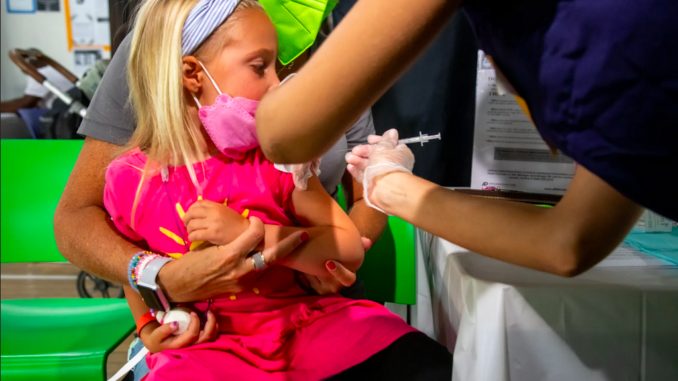
Big Pharma and the National Institute of Health (NIH) are making a controversial push to add a new fentanyl vaccine to the childhood immunization schedule, sparking heated debates about its potential impact and necessity.
The childhood vaccine schedule has expanded significantly in recent decades. In the 1960s, the U.S. childhood vaccine schedule included just a handful of vaccines, primarily for diphtheria, tetanus, pertussis (DTP), polio, and smallpox. By comparison, children today receive between 60 and 70 shots by the time they are adolescents.

BYPASS THE CENSORS
Sign up to get unfiltered news delivered straight to your inbox.
Latest Video
The fentanyl vaccine initiative follows the ongoing opioid crisis, which has claimed hundreds of thousands of lives in the US, and mainstream media has already begun promoting the idea.

Fentanyl, a powerful synthetic opioid, has increasingly infiltrated the drug supply, leading to overdoses in individuals who may not even realize they are consuming the substance.
To combat this, the NIH launched the HEAL (Helping End Addiction Long-term) Initiative, which supports the development of a vaccine designed to prevent fentanyl overdoses by blocking the drug’s ability to enter the brain.
The concept is simple: the vaccine would produce antibodies that target fentanyl in the bloodstream, preventing it from reaching the central nervous system, where it can be fatal.
Despite its promise, the proposal has raised questions about the ethics, effectiveness, and social implications of adding such a vaccine to childhood immunization schedules.
Elissa Weitzman, ScD, MSc, director of research for Boston Children’s Division of Addiction Medicine, led a study to explore whether parents would accept a vaccine targeting a drug addiction.
“Vaccines have been mostly about infectious disease,” Weitzman says. “The idea of a vaccine targeting a behavioral health disorder is a cognitive ‘whaaatt?’ Wherever we have confusion, there’s potential for mistrust and the need to explain and be transparent about the state of the science.”
Advocates see it as a proactive measure to save lives in a worsening opioid crisis. Many parents, particularly those who have lost children to fentanyl overdoses, argue that every child should receive the vaccine, especially before entering environments like college where drug exposure could occur. Some believe it could be a critical tool in preventing accidental overdoses, especially with fentanyl-laced substances becoming more prevalent.
However, there are also concerns and hesitations. Skeptics worry about long-term efficacy, potential side effects, and whether the vaccine might create a false sense of security, leading people to underestimate the dangers of opioid use. Some question if it could interfere with other medications or treatments, such as pain management or addiction therapies like methadone.
Additionally, the idea of vaccinating children against a drug-related threat has struck a chord with those who view addiction as a moral failing or believe that substance use should be addressed through behavioral interventions rather than medical solutions.
This perspective adds another layer of complexity to the debate, particularly given the controversial nature of vaccines in recent years, fueled by the COVID-19 pandemic.
As the fentanyl vaccine continues to develop, public health officials, scientists, and policymakers are grappling with the challenge of whether and how to introduce it.
The debate highlights deeper questions about addiction, prevention, and how society should respond to a crisis that continues to claim tens of thousands of lives each year.
Source link


